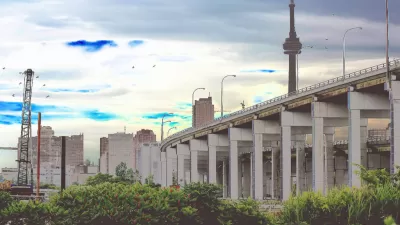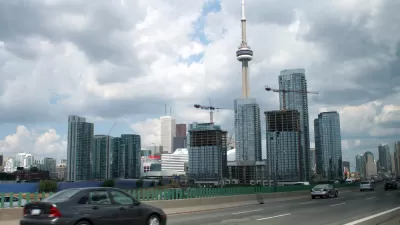As the full extent of the instability of Toronto's elevated Gardiner Expressway, and the city's apparent cover-up of the information, becomes clear, the new chief planner has weighed in on what the priorities should be in addressing the problem.

The signs of the Gardiner's fialing health have been raining down on Toronto's streets for some time. After at least seven incidents of falling-concrete this year, and a recent Toronto Star investigation that showed "the crumbling highway is in a state far worse than city staff previously told the public," the city's new chief planner Jennifer Keesmaat has waded into the debate over the future of Toronto's main commuter artery, reports Robyn Doolittle.
With reports indicating that, "[w]ithout half a billion dollars in emergency repair work to the deck, nearly half of the elevated portions of the Gardiner could be structurally unsafe within a decade," Keesmaat said "she is opposed to spending massive sums on infrastructure focused on 'moving more cars,'” and instead, "believes tax dollars are better spent on improving public transit."
"Keesmaat, who has been in the job less than six months, said she wants to immediately resume an environmental assessment that was quietly shelved after Mayor Rob Ford’s election," notes Doolittle. "That study was supposed to provide a cost-benefit analysis of tearing down versus maintaining the structure."
Writing in Spacing Toronto, Ken Greenberg sees the deterioration of the expressway as an opportunity for the city to engage in a serious discussion about "a more sustainable balance of mobility options."
"At a certain point," he says, "the cost and difficulty of maintaining or in our case entirely rebuilding these structures raises the question of whether it makes sense to keep them. Rather than replacement, the decaying infrastructure can be modified or altered to become one that favours more environmentally sound means of getting around harmonizes with a more productive city form."
FULL STORY: Gardiner Expressway: Chief planner wants to resurrect cost/benefit study

Planetizen Federal Action Tracker
A weekly monitor of how Trump’s orders and actions are impacting planners and planning in America.

Maui's Vacation Rental Debate Turns Ugly
Verbal attacks, misinformation campaigns and fistfights plague a high-stakes debate to convert thousands of vacation rentals into long-term housing.

San Francisco Suspends Traffic Calming Amidst Record Deaths
Citing “a challenging fiscal landscape,” the city will cease the program on the heels of 42 traffic deaths, including 24 pedestrians.

Amtrak Rolls Out New Orleans to Alabama “Mardi Gras” Train
The new service will operate morning and evening departures between Mobile and New Orleans.

The Subversive Car-Free Guide to Trump's Great American Road Trip
Car-free ways to access Chicagoland’s best tourist attractions.

San Antonio and Austin are Fusing Into one Massive Megaregion
The region spanning the two central Texas cities is growing fast, posing challenges for local infrastructure and water supplies.
Urban Design for Planners 1: Software Tools
This six-course series explores essential urban design concepts using open source software and equips planners with the tools they need to participate fully in the urban design process.
Planning for Universal Design
Learn the tools for implementing Universal Design in planning regulations.
Heyer Gruel & Associates PA
JM Goldson LLC
Custer County Colorado
City of Camden Redevelopment Agency
City of Astoria
Transportation Research & Education Center (TREC) at Portland State University
Jefferson Parish Government
Camden Redevelopment Agency
City of Claremont




























